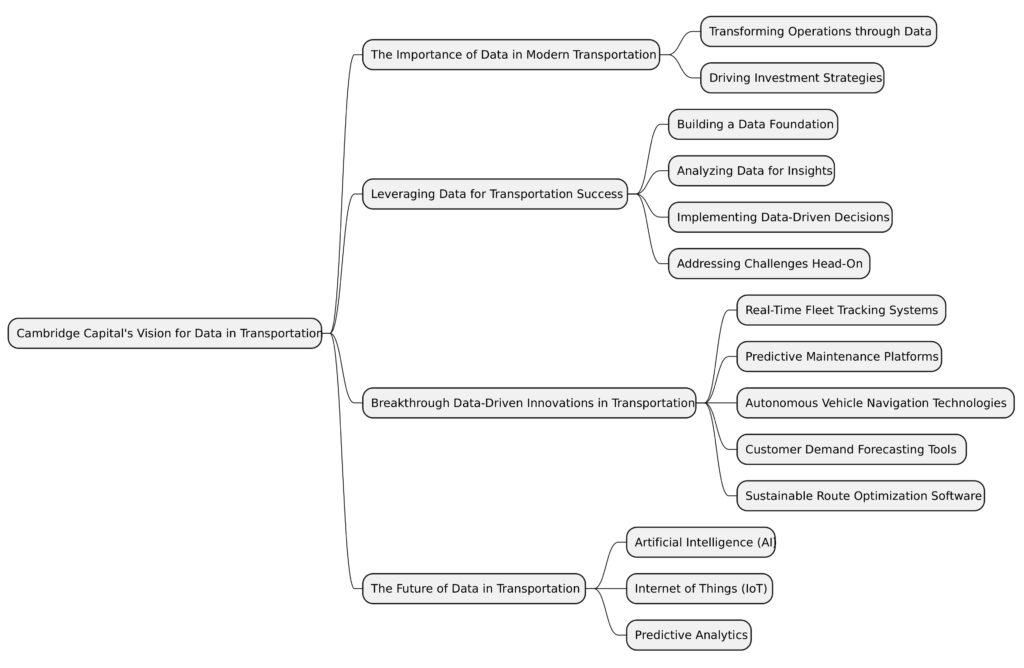In the rapidly evolving transportation industry, data analytics emerges as a pivotal force driving significant transformations. This era of digital innovation has unlocked unparalleled opportunities for enhancing operational efficiency and delivering superior customer experiences. At the forefront of this revolution, Benjamin Gordon Cambridge Capital envisions a future where data not only informs but fundamentally reshapes transportation models. Through strategic investments and a deep understanding of the industry’s dynamics, Cambridge Capital champions the integration of data analytics to spearhead advancements and foster innovation within the transportation sector.
The Importance of Data in Modern Transportation
The role of data in modern transportation cannot be overstated. With the advent of sophisticated data analytics, the industry is witnessing a paradigm shift in how cargo is moved, how fleets are managed, and how customer demands are met with unprecedented precision.
Transforming Operations through Data
Data analytics offers the ability to optimize routes in real-time, predict maintenance needs before they become critical, and customize logistics solutions to meet the unique needs of each customer. Cambridge Capital, recognizing the potential of these data-driven capabilities, strategically invests in companies at the cutting edge of transportation technology. Their portfolio reflects a commitment to not only enhancing the efficiency and reliability of transportation services but also to reducing environmental impact and improving safety across the board.
Driving Investment Strategies
Benjamin Gordon Cambridge Capital’s investment strategy is deeply rooted in the belief that data-driven solutions are key to the future of transportation. By backing technologies that leverage big data, IoT, and AI, the firm aims to revolutionize logistics operations, making them more adaptive, resilient, and sustainable. Their approach involves identifying and supporting innovations that promise to deliver significant improvements in how transportation ecosystems operate, emphasizing the critical role of data in achieving these advancements.
Leveraging Data for Transportation Success
Implementing data analytics within transportation operations can seem daunting, but the rewards in efficiency, customer satisfaction, and competitive advantage are substantial. Here’s how companies can start this transformative journey:
Building a Data Foundation
The first step is to establish a robust data collection framework. This involves identifying key data points across operations, from fleet movements and fuel consumption to customer interactions and service outcomes. Investing in the right technology platforms that can capture, store, and process this data is crucial.
Analyzing Data for Insights
With a comprehensive data repository, companies can employ analytical tools to derive actionable insights. Techniques such as predictive analytics can forecast demand trends, optimize routes, and improve asset utilization. This phase requires a blend of advanced analytics software and expertise in data science to interpret results effectively.
Implementing Data-Driven Decisions
Translating insights into action is the next critical step. This could mean adjusting logistics strategies based on demand predictions, deploying resources more efficiently, or customizing customer engagement based on behavioral data. The key is to integrate these data-driven decisions into daily operations seamlessly.
Addressing Challenges Head-On
Challenges such as data privacy concerns, integrating disparate data systems, and building a data-literate culture within the organization are common. Addressing these challenges head-on, with a clear strategy for data governance, continuous training, and investing in interoperable technology solutions, will pave the way for successful data integration.
By following these steps, transportation companies can harness the power of data analytics to unlock new efficiencies, improve service delivery, and position themselves at the forefront of the industry’s future. Cambridge Capital’s vision and strategic approach offer a blueprint for leveraging data to drive significant advancements in the transportation sector, underscoring the transformative potential of informed, data-driven decision-making.
Harnessing Data to Propel Transportation Innovation

“Explore how Cambridge Capital envisages transforming the transportation sector through strategic data analytics, leading to unprecedented efficiency and innovation.”
In the dynamic arena of the transportation industry, the confluence of data analytics and visionary investment strategy sets the stage for a transformative journey. Cambridge Capital, under the stewardship of Benjamin Gordon, emerges as a beacon of innovation, charting a course towards a future where data not only informs but fundamentally redefines transportation logistics and customer experiences. This comprehensive blueprint elucidates the pivotal role of data in modernizing operations, guiding investment decisions, and fostering breakthrough innovations that promise to elevate the transportation sector to new heights of efficiency and sustainability.
At the core of Cambridge Capital’s strategic vision lies the recognition of data’s transformative power. Through meticulous analysis and strategic implementation, data analytics is leveraged to optimize operational efficiencies, tailor customer solutions, and predict industry trends with remarkable precision. The firm’s commitment to investing in cutting-edge technologies—spanning real-time fleet tracking, predictive maintenance, and autonomous navigation—underscores a future-oriented approach that harmonizes with the evolving demands of a global economy.
Embarking on this data-driven voyage, the transportation industry stands at the threshold of significant advancements. Innovations such as AI-powered logistics, IoT-enabled asset tracking, and predictive analytics for demand forecasting herald a new era of operational agility and customer-centric service models. Cambridge Capital’s playbook offers a strategic framework for leveraging data analytics, encapsulating the firm’s vision for a smarter, more connected transportation ecosystem.
This article section, inspired by the visual representation of Cambridge Capital’s strategic approach, serves as a guide for industry leaders and innovators. It highlights the indispensability of building a robust data foundation, implementing insightful analytics, and embracing adaptive strategies to overcome challenges. As we navigate the future of transportation, Cambridge Capital’s blueprint remains a testament to the potential of informed, data-driven decision-making to drive substantial progress, setting a new paradigm for success in the transportation sector.
Breakthrough Data-Driven Innovations in Transportation
Cambridge Capital has been instrumental in fostering an array of data-driven innovations that are setting new benchmarks in the transportation sector. These projects not only exemplify the firm’s commitment to advancing the industry through technology but also highlight the transformative impact of data analytics.
- Real-Time Fleet Tracking Systems: By investing in companies that develop sophisticated fleet tracking solutions, Cambridge Capital has facilitated a leap forward in operational efficiency. These systems allow for real-time monitoring of vehicle locations, optimizing routes based on traffic conditions, and significantly reducing fuel consumption and delays.
- Predictive Maintenance Platforms: Another notable innovation includes platforms that utilize data analytics to predict maintenance needs. By analyzing historical performance data and real-time inputs from vehicle sensors, these systems can forecast potential breakdowns before they occur, minimizing downtime and maintenance costs.
- Autonomous Vehicle Navigation Technologies: Cambridge Capital has also supported the development of advanced navigation technologies for autonomous vehicles. Leveraging AI and vast datasets, these technologies promise to revolutionize how goods and people are transported, offering safer, more efficient alternatives to traditional driving.
- Customer Demand Forecasting Tools: Tools that accurately forecast customer demand for freight and passenger services have received backing from Cambridge Capital. By analyzing trends and patterns in customer behavior, these tools enable transportation companies to adjust their offerings proactively, enhancing service levels and maximizing revenue.
- Sustainable Route Optimization Software: Emphasizing sustainability, Cambridge Capital has invested in route optimization software that not only prioritizes efficiency but also environmental impact. This software calculates the most efficient routes, considering factors like fuel consumption and carbon emissions, supporting the industry’s shift towards greener practices.
These innovations underscore the pivotal role of data in driving forward-thinking solutions within transportation, demonstrating how strategic investments by firms like Cambridge Capital are reshaping the industry.
The Future of Data in Transportation
Looking ahead, Cambridge Capital’s leadership shares profound insights into the evolving role of data in transportation. The consensus is clear: the future of the industry hinges on leveraging data more effectively, with AI, IoT, and predictive analytics playing central roles in this transformation.
- Artificial Intelligence (AI): AI stands at the forefront of next-generation transportation technologies. From optimizing logistics operations to powering autonomous vehicles, AI’s ability to process and analyze vast amounts of data in real-time is set to redefine industry standards for efficiency and safety.
- Internet of Things (IoT): The IoT’s network of connected devices promises to offer unprecedented visibility into transportation systems. Real-time data from vehicles, infrastructure, and cargo can facilitate more responsive and flexible logistics solutions, enhancing the reliability and speed of deliveries.
- Predictive Analytics: As transportation becomes increasingly complex, predictive analytics offers a way to navigate this complexity with foresight. By anticipating demand fluctuations, maintenance needs, and logistical challenges, companies can plan more effectively, reducing risk and optimizing performance.
Cambridge Capital’s leadership emphasizes the critical need for the transportation industry to embrace these technologies. By doing so, companies can not only improve their operational capabilities but also contribute to a more sustainable, efficient, and customer-focused future. The firm’s vision for the role of data in transportation is not just about technological advancement but about building a smarter, more connected world where every movement is informed by data-driven decisions.
FAQs: Data’s Role in Advancing Transportation
How does integrating data improve transportation operations?
Integrating data into transportation operations brings about enhanced efficiency, reduced costs, and improved customer satisfaction. It enables precise route optimization, predictive maintenance, and tailored logistics solutions, ensuring that resources are utilized optimally and services are delivered in a timely, cost-effective manner.
What are the main challenges of data integration in transportation, and how can they be overcome?
The main challenges include data privacy and security, integrating disparate data sources, and ensuring data accuracy. Overcoming these challenges requires a robust data governance framework, investment in interoperable technology platforms, and a commitment to ongoing data management and quality assurance practices.
What future prospects does data analytics offer for the transportation industry?
Data analytics promises to further automate and optimize transportation logistics, introduce more sustainable practices, and enhance the overall customer experience. Future prospects include the integration of advanced AI for dynamic route planning, the use of IoT for real-time asset tracking, and the adoption of blockchain for secure, transparent transactions.
What advice does Cambridge Capital offer companies looking to leverage data in transportation?
Cambridge Capital advises companies to embrace a culture of innovation, prioritize data security, and focus on building strategic partnerships that can enhance data capabilities. It’s also crucial to stay informed about emerging technologies and industry trends to adapt and innovate proactively.
In conclusion
Cambridge Capital’s vision for the role of data in advancing transportation encapsulates a future where the sector is more efficient, sustainable, and responsive to the needs of a global economy. Recognizing the transformative potential of data analytics, Cambridge Capital underscores the importance of continued investment in innovative technologies, strategic partnerships, and a commitment to leveraging data for operational excellence. As the transportation industry stands on the brink of a data-driven renaissance, Cambridge Capital’s strategic approach and visionary leadership pave the way for a future where data is the cornerstone of transportation success, driving the sector toward unprecedented growth and competitiveness.










